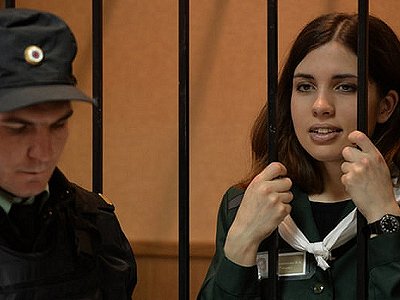
THE AMNESIA OF NATIONS
The Russian punk band Pussy Riot, however crass and insensitive, has a point
Russia’s government has many internal critics but few have made an impression on western publics in the way the protest punk band Pussy Riot has achieved. The image of photogenic young feminists courageously – and foolishly – staging a flash performance in the Cathedral of Christ the Saviour, Moscow in February 2012 with brightly coloured balaclavas and a dance routine that made David Brent look like Michael Jackson has done more than many to shine a light on state corruption and the insidious rule of the Siloviki, the politicians with long histories in the security services.
Their choice of venue was deliberate, for they – among many - are unsettled by the links between Putin’s government and the Russian Orthodox Church. In retrospect they may have thought more carefully about the insult to devout Russians: for a generation, believers had to endure the intentional desecration of churches by the communists and their performance seemed, to many, to emerge from the same spirit of contempt for belief shown by the Bolsheviks. Yet their protest still points to some uncomfortable truths.
In the thirty-six years from its creation to the death of Stalin, according to historian David Satter, ‘the Soviet regime executed, starved, or worked to death some 20 million persons, not including 4 million killed during the Civil War and 5 million who died as a result of the 1921-23 famine….No other regime in history has ever inflicted such an inferno on its own people’. The paranoid Stalinist purges of 1937-38 resulted in nearly 682,000 people being shot and more than 663,000 being sent to labour camps, where almost all of them died. In this, the KGB bore much responsibility.
Its successor, the FSB has a church dedicated to it: Saint Sophia Wisdom of God on Lubyanskaya Square. The service of dedication which took place on March 6, 2002 was led by the Orthodox Patriarch and high-ranking FSB officers, though when asked to kneel for the blessing of the church, FSB personnel remained on their feet, neither crossing themselves nor closing their eyes but watching the Patriarch. There was not a single reference to the millions of people who suffered at the hands of the FSB’s predecessors, the KGB and the NKVD. As the theologian Andrei Zubov observed: ‘this is not the fruit of repentance, and this organisation has something to repent for’.
Russia has almost no memorials to those who died in the communist era as a result of its excesses. The Solovetsky stone is the only memorial in Moscow to those murdered; it is a gray boulder from the site of the first Soviet camps for political prisoners. In late 1990, as the Soviet Union was drawing its last breaths, the stone was dedicated on Dzerzhinsky Square. It should have been the beginning of a long sequence of memorials enshrining the lives of those tossed cruelly onto history’s scrapheap by the Soviets but it ended up being one of the last. As Russia descended into economic chaos and criminal mismanagement in the 1990s, people who were trying to stay alive and hold on to their savings had little time or money to devote to remembrance.
The failure ultimately to account for a nation’s crimes on its own people and the lack of any sanctioned memorialisation of the victims means the individual person still counts for little in comparison to the might of the State. Power in Russia is also concentrated into few hands, and a small number have captured state institutions to make them serve their own purposes. The tragedy is that so many talented and selfless people have perished or been silenced; their heroism lives on in today’s protest movement, heir of the conscience of the generation above them.
Russia’s amnesia reminds other nations of the importance of memory and the dignifying of those who die through the failings of nations to resolve their problems peaceably. It is easy to criticise other countries, especially when its lapses are so manifest; the harder, more demanding task is to perceive the sins of our own national life and history and to make an honest, unsparing account of them alongside the monuments to victory and success. For the Church to play a godly role in this may require enough distance in practice from the State to be fruitfully critical but sufficient nearness to remain an influential friend.
POPULAR ARTICLES

Obama's Covert Wars
The use of drones is going to change warfare out of all recognition in the next decades.

Through A Glass Starkly
Images of traumatic incidents caught on mobile phone can be put to remarkable effect.

What Are British Values?
Is there a British identity and if so, what has shaped the values and institutions that form it?


